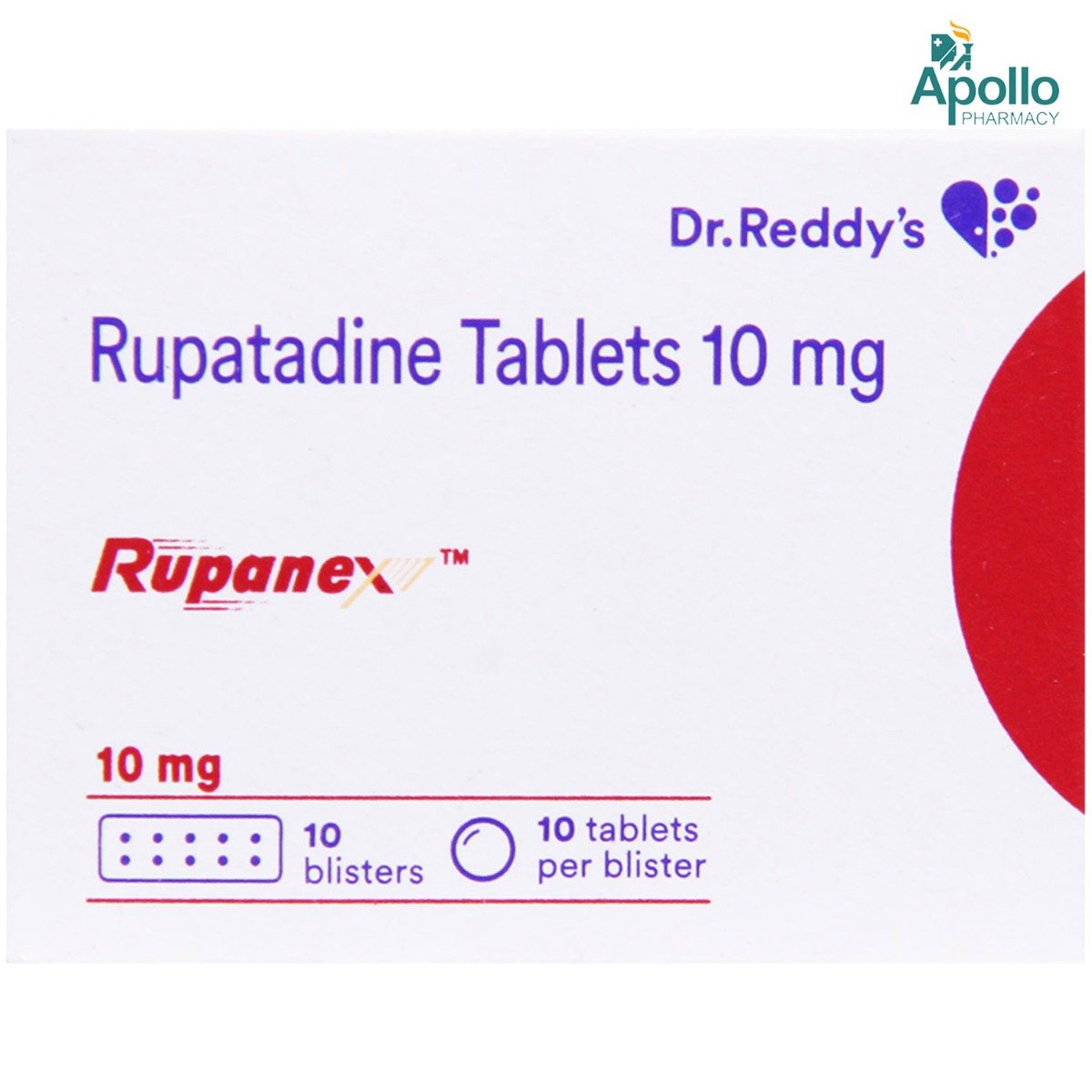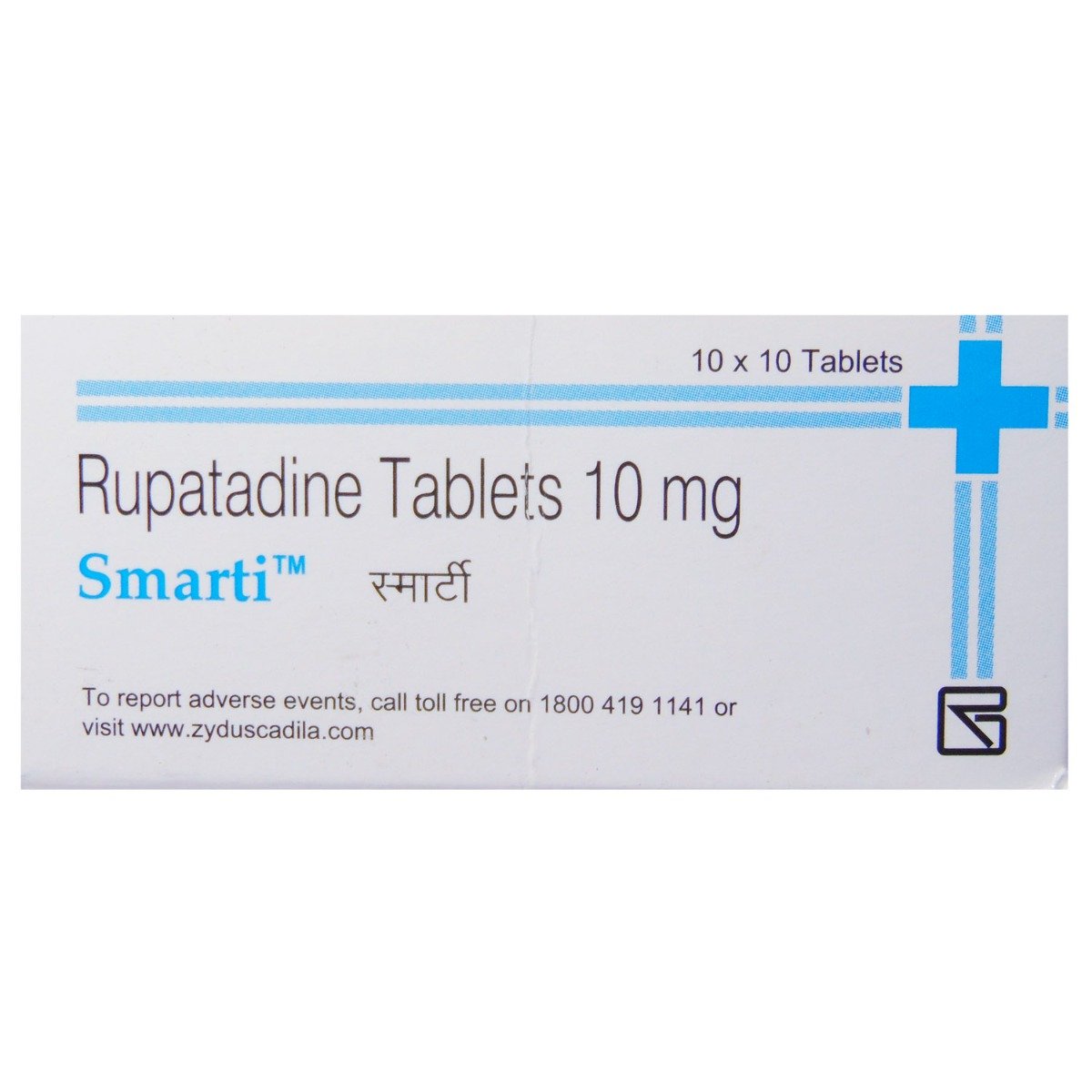Rupameg 10mg Tablet
MRP ₹132.35
(Inclusive of all Taxes)
₹19.9 Cashback (15%)
Provide Delivery Location
Online payment accepted
 Prescription drug
Prescription drugWhats That
Composition :
Manufacturer/Marketer :
Consume Type :
Return Policy :
About Rupameg 10mg Tablet
Rupameg 10mg Tablet belongs to a class of drugs called 'anti-histamine or anti-allergic which is used in the treatment of allergic conditions such as allergic rhinitis and urticaria. Allergic rhinitis, also known as hay fever, is a type of inflammation in the nose which occurs when the immune system overreacts to allergens in the air. Urticaria, also known as hives, is an outbreak of swollen, pale red bumps or plaques (wheals) on the skin that appear suddenly, either as a result of the body's reaction to certain allergens or for unknown reasons.
Rupameg 10mg Tablet contains 'Rupatadine.' It works by reducing a chemical substance called histamine, which is responsible for causing allergic symptoms itching, sneezing, runny nose, swelling and rashes.
You can take Rupameg 10mg Tablet with food or without food. It should be swallowed whole with a glass of water. Do not chew, bite, or break it. Your doctor will advise you on how often you take your tablets based on your medical condition. In some cases, you may experience common side effects like headache, dizziness, dry mouth, fatigue, tiredness, nausea, and abdominal pain. Most of these side effects of Rupameg 10mg Tablet do not require medical attention and gradually resolve over time. However, if the side effects are persistent, stop the medicine and reach out to your doctor.
You should not take Rupameg 10mg Tablet if you are allergic to Rupameg 10mg Tablet. Take the Rupameg 10mg Tablet as advised by your doctor. Tell your doctor about the medicines which you are taking other than the Rupameg 10mg Tablet. Inform your doctor, before taking Rupameg 10mg Tablet in pregnant/planning to get pregnant/breast-feeding women. Rupameg 10mg Tablet should be used with caution in elderly patients (age > 65 years) due to the increased risk of severe adverse effects. Rupameg 10mg Tablet should be used with caution in heart, kidney and liver patients.
Uses of Rupameg 10mg Tablet
Directions for Use
Key Benefits
Rupameg 10mg Tablet contains 'Rupatadine' that belongs to a class of 'anti-histamine or anti-allergic drugs. It is used in the treatment of allergic conditions, such as allergic rhinitis and urticaria and works by reducing a chemical substance called histamine, which is responsible for causing allergic symptoms itching, sneezing, runny nose, swelling and rashes.
Storage
Drug Warnings
You should not take Rupameg 10mg Tablet if you are allergic to Rupameg 10mg Tablet.Take the Rupameg 10mg Tablet as advised by your doctor. Tell your doctor about the medicines which you are taking other than the Rupameg 10mg Tablet.Inform your doctor, before taking Rupameg 10mg Tablet in pregnant/planning to get pregnant/breast-feeding women.Rupameg 10mg Tablet should be used with caution in elderly patients (age > 65 years) due to the increased risk of severe adverse effects.Rupameg 10mg Tablet should be used with caution in heart, kidney and liver patients. Due to the presence of lactose monohydrate in Rupameg 10mg Tablet, patients with rare hereditary problems of galactose intolerance, total lactase deficiency or glucose-galactose malabsorption should not take this medicine. Avoid alcohol With Rupameg 10mg Tablet it may cause adverse effects. Rupameg 10mg Tablet may cause drowsiness, so do not drive/operate a machine.
Diet & Lifestyle Advise
- Staying hydrated is vital for those with a cough or cold.
- Drinking liquids at room temperature can alleviate cough, runny nose, and sneezing.
- The immune system is affected by stress and raises the risk of being sick.
- An individual can exercise regularly, meditate, do deep breathing, and try progressive muscle relaxation techniques to relieve stress.
- To stay fit and safe, try to sleep at least 8 hours each night.
- It is advised to avoid contact with known allergens (allergy-causing agents) such as pollen, dust, etc.
- Maintain personal hygiene and keep your surroundings clean.
Side Effects of Rupameg 10mg Tablet
- Headache
- Dizziness
- Dry mouth
- Fatigue
- Tiredness and weakness
- Nausea
- Abdominal pain
- Diarrhea
- Vomiting
- Constipation
- Rash
Habit Forming
Therapeutic Class
All Substitutes & Brand Comparisons
RX
Out of StockRup AL 10mg Tablet
Hetero Drugs Ltd
₹49
(₹4.41 per unit)
62% CHEAPERRX
Out of StockRalzal 10 mg Tablet 10's
FDC Ltd
₹52.3
(₹4.71 per unit)
60% CHEAPERRX
Out of StockRupastar 10mg Tablet
Invision Medi Sciences Pvt Ltd
₹55
(₹4.95 per unit)
58% CHEAPER
FAQs
Drug-Drug Interactions Checker List
- ATORVASTATIN
- LOVASTATIN
- DIPHENHYDRAMINE
- MIDAZOLAM
- ERYTHROMYCIN
- ITRACONAZOLE
- KETOCONAZOLE
- POSACONAZOLE
- FLUCONAZOLE
- VORICONAZOLE
- INDINAVIR
- RITONAVIR
- NEFAZODONE
- DILITAZEM
- CICLOSPORIN
- SIROLIMUS
- TACROLIMUS
- EVEROLIMUS
- CISAPRIDE
- ALCOHOL
Special Advise
Stop taking Rupameg 10mg Tablet at least three days before taking an allergy test as it can affect the test results.
Disease/Condition Glossary
Allergic rhinitis: Allergic rhinitis, also known as hay fever, is a type of inflammation in the nose which occurs when the immune system overreacts to allergens in the air. Signs and symptoms include a runny or stuffy nose, sneezing, red, itchy, and watery eyes, and swelling around the eyes. It is caused by the most common airborne allergens that cause rhinitis are dust mites, pollen and spores and animal skin, urine and saliva.
Urticaria: Urticaria is also called hives is a common skin rash triggered by many things, including certain foods, medication and stress. Symptoms include itchy, raised, red or skin-coloured welts on the skin's surface.

Have a query?
Alcohol
Safe if prescribed
Consumption of alcohol is not recommended during treatment with this medicine due to the increased risk of severe adverse effects.
Pregnancy
Consult your doctor
Rupameg 10mg Tablet is not recommended for use in pregnant women unless absolutely necessary. All the risks and benefits should be discussed with the doctor before taking this medicine.
Breast Feeding
Consult your doctor
Rupameg 10mg Tabletis not recommended for use in breastfeeding women unless absolutely necessary. All the risks and benefits should be discussed with the doctor before taking this medicine. Your doctor may advise you to discontinue the drug or to discontinue breastfeeding based on your clinical condition.
Driving
Safe if prescribed
Rupameg 10mg Tablet may cause drowsiness or dizziness in some patients. It is advised that you do not perform any activities such as driving a vehicle or operating machinery if you experience any of these symptoms during treatment with this medicine.
Liver
Consult your doctor
Rupameg 10mg Tablet is not recommended for use in patients with a known history of renal diseases since the safety and efficacy of use are not clinically established for such patients.
Kidney
Consult your doctor
Rupameg 10mg Tablet is not recommended for use in patients with a known history of renal diseases since the safety and efficacy of use are not clinically established for such patients.
Children
Safe if prescribed
Rupameg 10mg Tablet should not be recommended for below 2years, But in above 2years children Rupameg 10mg Tablet is recommended with dose and dosage adjustments should be made by your doctor.








